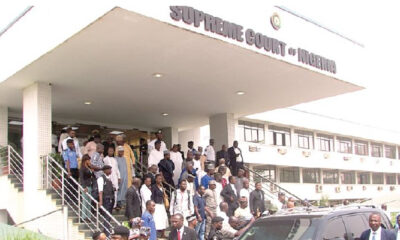
The Minister of Finance, Mrs. Kemi Adeosun, has said that she cannot predict when the nation will get out of the current economic recession.
She, however, said that some of the efforts of the government to reflate the economy had started yielding results.
The minister, who spoke in an interview in Abuja, stated, “I don’t want to predict when we will get out of recession. Let me tell you that we will get into growth and that’s how you get out of recession, because of the stimulus that we are providing.
“And it may take longer than we would like, but we will definitely get out of it. We are already seeing some positive signs in agriculture and solid minerals;and with what we are trying to do with other sectors, I am very sure we will get out of it soon.”
The Governor of Central Bank of Nigeria, Mr. Godwin Emefiele, had last week stated that the country would start getting out of recession by the fourth quarter of the year.
He had said, “We are already in the valley, the only direction is to go up the hill and the government is doing everything possible to ensure that we move up the hill. I am optimistic that based on the actions being taken by the monetary and fiscal authorities, the fourth quarter results will show evidence that we have started to move out of recession.
“The worst is over. The Nigerian economy is on the path of recovery and growth. So, please if you are a bystander or sideliner, you are losing; join the train now before it leaves the station.”
To facilitate the recovery of the economy from recession, Adeosun said about N770bn had been channelled into the economy for various capital projects this year, adding that the monitoring team in the Ministry of Budget and Planning was putting contractors on their toes to ensure that they delivered the projects.
The minister explained that despite the recession, lots of foreign investors were still interested in coming to invest in Nigeria.
As a demonstration of their interest in the country, she said the $1bn Eurobond being floated by the country had received a lot of commitments from investors, adding that the funds would start coming in before the end of the year.
She also said that the Federal Government had yet to take a final decision on which of the country’s national assets it would dispose of to finance the 2016 budget.
The position of the minister is against the widely held belief that the government has concluded plans to dispose of some important national assets such as the Nigerian Liquefied Natural Gas, the Nigerian National Petroleum Corporation and the refineries.
The planned sale of the assets is being opposed by the organised labour, civil society organisations, industry stakeholders, professional bodies and financial analysts.
But Adeosun said while the government was mindful of the feelings of Nigerians, it was currently faced with serious financial challenge, which had made it imperative to raise funds from other sources.
She said the government recognised the fact that funding could be raised through borrowing, but lamented that this was not the best option now owing to the huge infrastructural deficit in the country.
The minister added that the type of financial resources needed to fund critical projects that would unlock the economic potential of the country could not be raised from borrowing, hence the need to dispose of what she described as underutilised national assets.
She said, “I think there are a number of assets that are being considered and I don’t think we have said this one or that one. There are some unused assets that are just lying idle, which people have come and suggested that ‘these things you are not using, can we lease them from you for money?’
“Hence, when they lease them from us, the taxes are still going to come to us. So, there are some things the government is sitting on, we don’t have money to do it, it makes sense for me to unlock those things. So,they bring money into the economy at these difficult times so that we can move forward.
“We have not got to the stage of saying it’s this asset, or that. But it’s more of the conversation around should we just keep on borrowing or shall we know that things are a lot more difficult than we envisaged and turn on to an alternative strategy, which is looking at some of the underutilised assets and releasing them.”
She added, “We think that the infrastructure challenges that we face are so serious and the kind of money that we need, we can’t borrow. When you have an accumulated deficit, you need to look for the money that will sustain what you are doing for the next three to four years.
“That is what we are doing, having more of a strategic approach so that over time, we will borrow less, and which of course is good.”
When asked what type of sale arrangement the government was considering for the national assets, the minister said this depended on the asset classes.
She said, “It depends on which one. There are some assets which you can lease and others you may need to divest from. The investor will also have to look at the risks and the pricing. Some assets just make sense to just leave them and there are some, which you may just sell but still hold on to the majority stake.
“So, it makes sense and you can sell to the Nigerian people and list on the Nigerian Stock Exchange. So, there are different kinds of sales.”

 BIG STORY13 hours ago
BIG STORY13 hours ago
 BIG STORY4 days ago
BIG STORY4 days ago
 BIG STORY2 days ago
BIG STORY2 days ago
 BIG STORY2 days ago
BIG STORY2 days ago
 BIG STORY3 days ago
BIG STORY3 days ago
 BIG STORY1 day ago
BIG STORY1 day ago
 BIG STORY2 days ago
BIG STORY2 days ago
 BIG STORY3 days ago
BIG STORY3 days ago





















